
In 1994, Congress established an exception to the English and civics testing requirements for applicants

In April, the U.S. Citizenship and Immigration Services (USCIS) put out a request for public input regarding Identifying Barriers Across U.S. Citizenship and Immigration Services (USCIS) Benefits and Services. The ILRC has submitted these comments.
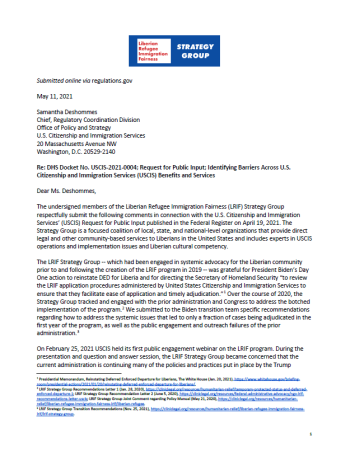
The Liberian Refugee Immigration Fairness (LRIF) Strategy Group submitted these comments in connection with the U.S. Citizenship and Immigration Services’ (USCIS) Request for Public Input published in the Federal Register on April 19, 2021. The Strategy Group is a focused coalition of local, state, and national-level organizations that provide direct legal and other community-based services to Liberians in the United States and includes experts in USCIS operations and implementation issues and Liberian cultural competency.
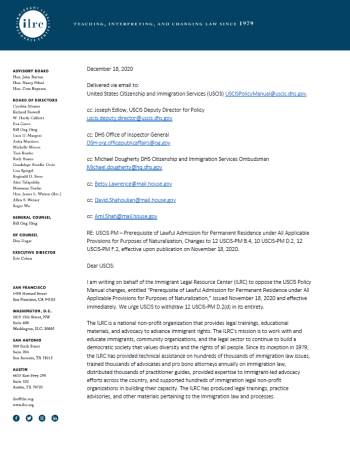
ILRC submitted these comments on December 18, 2020 to oppose the administration's dramatic expansion of USCIS guidance on how to assess whether someone has a “lawful admission” for purposes of naturalization eligibility under INA § 318. The updated policy guidance is an unwarranted directive to officers to engage in extreme vetting and unnecessary scrutiny of all naturalization applicants.

On March 16, 2021, ILRC and seven other coalition members of the Liberian Refugee Immigration Fairness (LRIF) Strategy Group submitted recommendations to the Administration and USCIS leadership for equitable implementation of LRIF. The group requested a meeting with the government to discuss these recommendations.
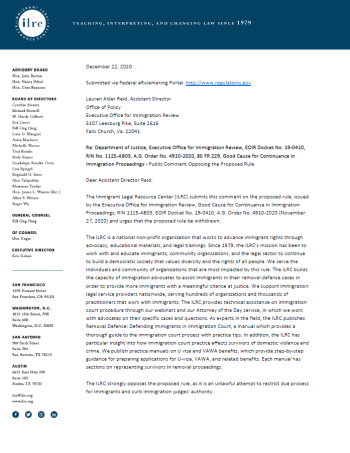
On December 22, 2020, the ILRC submitted comments in opposition to EOIR’s notice of proposed rulemaking regarding what constitutes “good cause” for a continuance in removal proceedings. The proposed changes severely restrict the circumstances in which respondents can obtain continuances in removal proceedings, as well as the number and length of continuances. These changes will have a devastating impact on respondents’ due process rights, essentially eliminate protections from removal for VAWA and U-visa petitioners, further interfere with the independence of immigration judges, and curtail administrative efficiency.
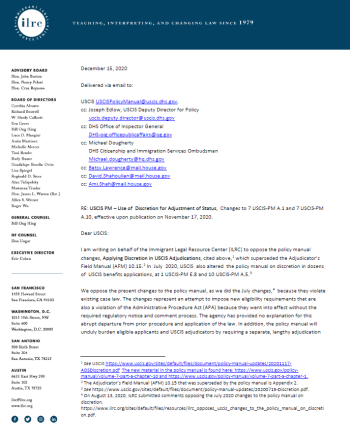
ILRC filed comments opposing USCIS’s changes to discretion in adjustment because they violate existing case law. The changes represent an attempt to impose new eligibility requirements that are also a violation of the Administrative Procedure Act (APA) because they went into effect without the required regulatory notice and comment process. The agency has provided no explanation for this abrupt departure from prior procedure and application of the law. In addition, the policy manual will unduly burden eligible applicants and USCIS adjudicators by requiring a separate, lengthy adjudication of thirty specific discretionary factors under a heightened burden of proof that requires adjustment applicants to show “clearly and beyond doubt” that they are eligible for adjustment. The new emphasis on a balancing of a myriad of factors invites arbitrary and inconsistent application of the law.
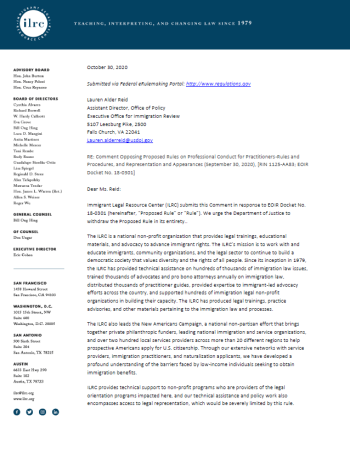
On October 30, 2020, ILRC filed a comment opposing an EOIR proposed rule that would have a substantial negative impact on legal orientation programs operated by non-profit immigration legal services programs.
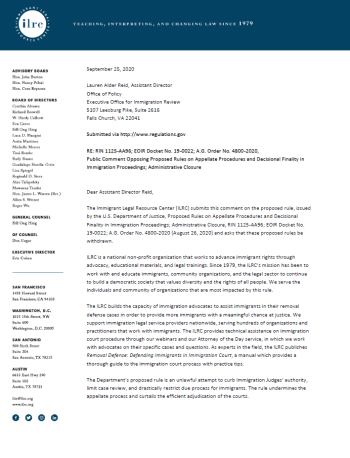
On September 25, ILRC submitted comments in opposition to EOIR's proposed rule regarding court procedures. The proposed rule is an unlawful attempt to curb Immigration Judges’ authority, limit case review, and drastically restrict due process for immigrants. The rule undermines the appellate process and curtails the efficient adjudication of the courts.
